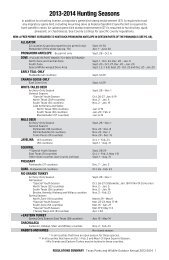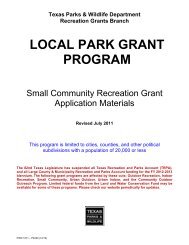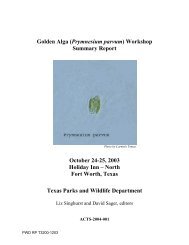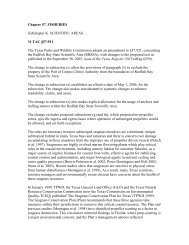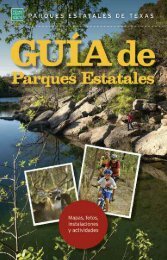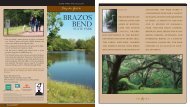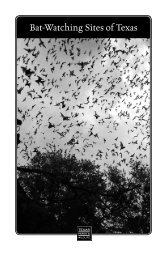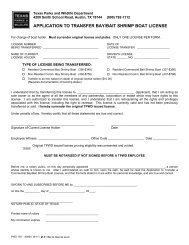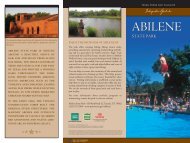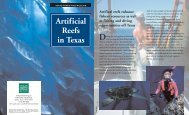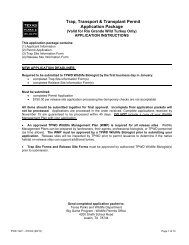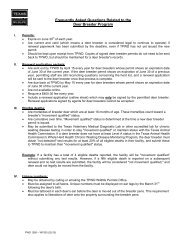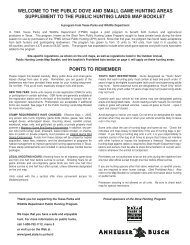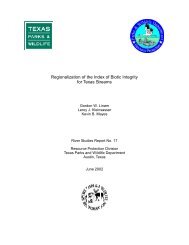1-1 Appendix 1 Responses to survey questions administered to ...
1-1 Appendix 1 Responses to survey questions administered to ...
1-1 Appendix 1 Responses to survey questions administered to ...
You also want an ePaper? Increase the reach of your titles
YUMPU automatically turns print PDFs into web optimized ePapers that Google loves.
the HOH has also resulted in very little interaction with University researchers in<br />
the state, and I think there are some detriments <strong>to</strong> that – including a lack of<br />
interactions with extra-agency researchers who could offer valuable insights.<br />
• Impediment – Although the leadership of the TPWD uses scientific information<br />
and stresses the need <strong>to</strong> “use good science”, it does not demonstrate that such<br />
information is critical <strong>to</strong> resource management. There appears <strong>to</strong> be a lack of<br />
desire <strong>to</strong> communicate across divisions <strong>to</strong> develop broad goals with quantifiable<br />
objectives and <strong>to</strong> establish a framework <strong>to</strong> use science <strong>to</strong> meet these goals.<br />
Without a clear focus on science or agency objectives, resource management<br />
decisions are made based on the goals of individual division direc<strong>to</strong>rs. Such goals<br />
frequently focus on immediate needs without considering long-term direction.<br />
Often science is not used in these decisions. When science is used, it is typically<br />
with data collected for other purposes and only when it backs the decision.<br />
• Impediment=time and precision of estimates.<br />
• Takes <strong>to</strong>o long between data collection/analysis <strong>to</strong> implementation of regula<strong>to</strong>ry<br />
changes.<br />
• The lack of a clear set of interrelated goals regarding our varied challenges in<br />
resource management severely hampers our ability <strong>to</strong> obtain and utilize good data.<br />
• Greatest impediment is the lack of communication of new scientific methods and<br />
how <strong>to</strong> use them.<br />
• The greatest impediment in application of scientific information that I have<br />
observed is the difficulty our field staff, and even our HOH research staff, have in<br />
gaining access <strong>to</strong> scientific literature. Access <strong>to</strong> journal articles and books are<br />
limited. But the most severe need is for convenient access <strong>to</strong> a computerized<br />
service which allows for a thorough searching of <strong>to</strong>pics (and authors name, etc.)<br />
in major and minor journals, plus access <strong>to</strong> copies of the abstracts from articles<br />
identified by any particular search.<br />
• Weakness: Managers’ special projects take a back seat because of limited staff<br />
hours. These projects could have a lot more potential if cooperation was<br />
encouraged between TPWD and universities. Also, scientific information in the<br />
form of journal subscriptions, library databases, etc. is practically non-existent for<br />
field staff.<br />
• The biggest impediment may be assessment procedures, which may not<br />
adequately sample the important recreational species.<br />
• Budgetary constraints – we know what we need <strong>to</strong> do we just can’t afford <strong>to</strong> do<br />
enough of it.<br />
• Our greatest impediment is (as for most natural resource agencies) the need for<br />
additional personnel.<br />
• The economy and budgetary restrictions are probably one of our biggest<br />
impediments. Severe limits on the number of new vehicles and computers<br />
purchased in a year, along with a lack of pay increases for personnel, agencywide,<br />
over a period of years now, is starting <strong>to</strong> slowly impact operations. At that<br />
pace, it can be anticipated that employee retention could drop, and maintenance<br />
costs could increase if a change does not occur soon.<br />
2-25



